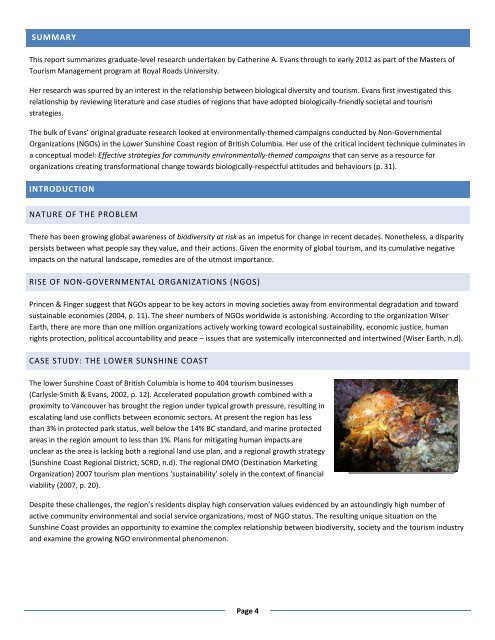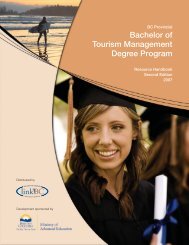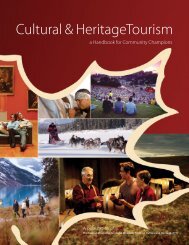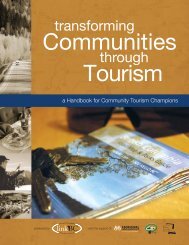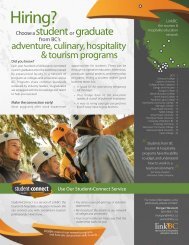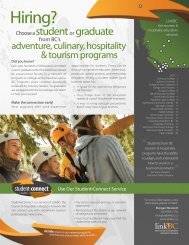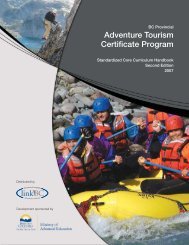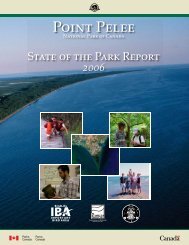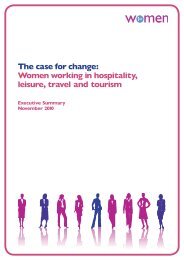Biologically-Respectful Tourism - LinkBC
Biologically-Respectful Tourism - LinkBC
Biologically-Respectful Tourism - LinkBC
You also want an ePaper? Increase the reach of your titles
YUMPU automatically turns print PDFs into web optimized ePapers that Google loves.
SUMMARY<br />
This report summarizes graduate‐level research undertaken by Catherine A. Evans through to early 2012 as part of the Masters of<br />
<strong>Tourism</strong> Management program at Royal Roads University.<br />
Her research was spurred by an interest in the relationship between biological diversity and tourism. Evans first investigated this<br />
relationship by reviewing literature and case studies of regions that have adopted biologically‐friendly societal and tourism<br />
strategies.<br />
The bulk of Evans’ original graduate research looked at environmentally‐themed campaigns conducted by Non‐Governmental<br />
Organizations (NGOs) in the Lower Sunshine Coast region of British Columbia. Her use of the critical incident technique culminates in<br />
a conceptual model: Effective strategies for community environmentally‐themed campaigns that can serve as a resource for<br />
organizations creating transformational change towards biologically‐respectful attitudes and behaviours (p. 31).<br />
INTRODUCTION<br />
NATURE OF THE PROBLEM<br />
There has been growing global awareness of biodiversity at risk as an impetus for change in recent decades. Nonetheless, a disparity<br />
persists between what people say they value, and their actions. Given the enormity of global tourism, and its cumulative negative<br />
impacts on the natural landscape, remedies are of the utmost importance.<br />
RISE OF NON‐GOVERNMENTAL ORGANIZATIONS (NGOS)<br />
Princen & Finger suggest that NGOs appear to be key actors in moving societies away from environmental degradation and toward<br />
sustainable economies (2004, p. 11). The sheer numbers of NGOs worldwide is astonishing. According to the organization Wiser<br />
Earth, there are more than one million organizations actively working toward ecological sustainability, economic justice, human<br />
rights protection, political accountability and peace – issues that are systemically interconnected and intertwined (Wiser Earth, n.d).<br />
CASE STUDY: THE LOWER SUNSHINE COAST<br />
The lower Sunshine Coast of British Columbia is home to 404 tourism businesses<br />
(Carlysle‐Smith & Evans, 2002, p. 12). Accelerated population growth combined with a<br />
proximity to Vancouver has brought the region under typical growth pressure, resulting in<br />
escalating land use conflicts between economic sectors. At present the region has less<br />
than 3% in protected park status, well below the 14% BC standard, and marine protected<br />
areas in the region amount to less than 1%. Plans for mitigating human impacts are<br />
unclear as the area is lacking both a regional land use plan, and a regional growth strategy<br />
(Sunshine Coast Regional District, SCRD, n.d). The regional DMO (Destination Marketing<br />
Organization) 2007 tourism plan mentions ‘sustainability’ solely in the context of financial<br />
viability (2007, p. 20).<br />
Despite these challenges, the region’s residents display high conservation values evidenced by an astoundingly high number of<br />
active community environmental and social service organizations, most of NGO status. The resulting unique situation on the<br />
Sunshine Coast provides an opportunity to examine the complex relationship between biodiversity, society and the tourism industry<br />
and examine the growing NGO environmental phenomenon.<br />
Page 4


